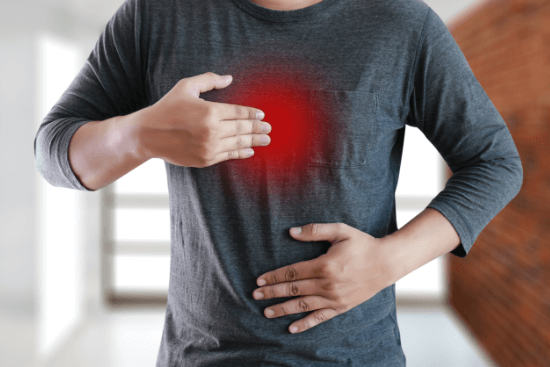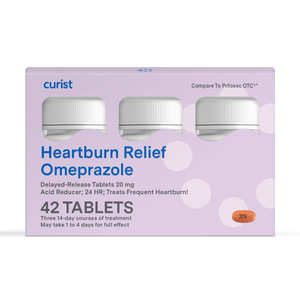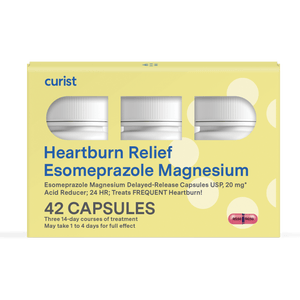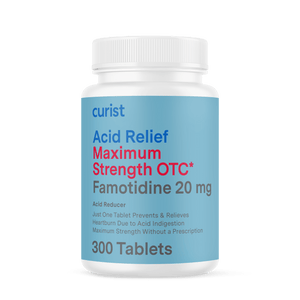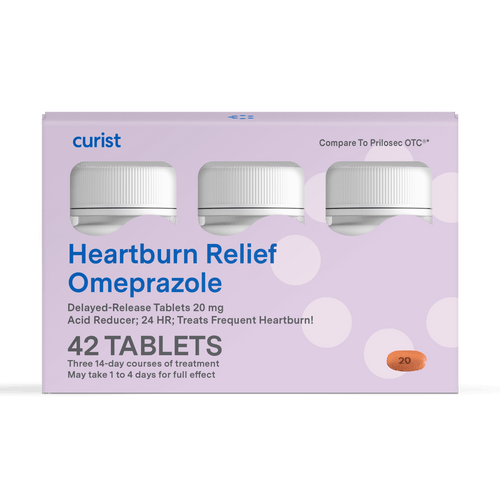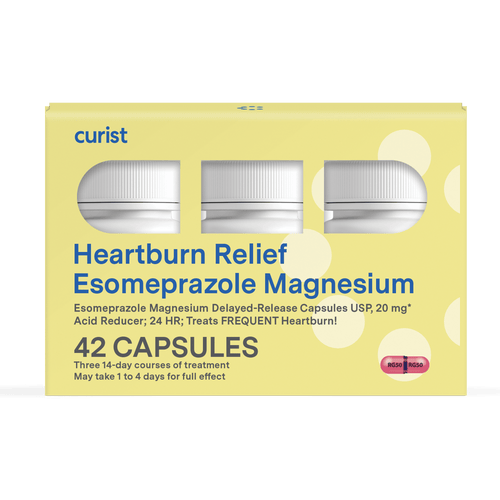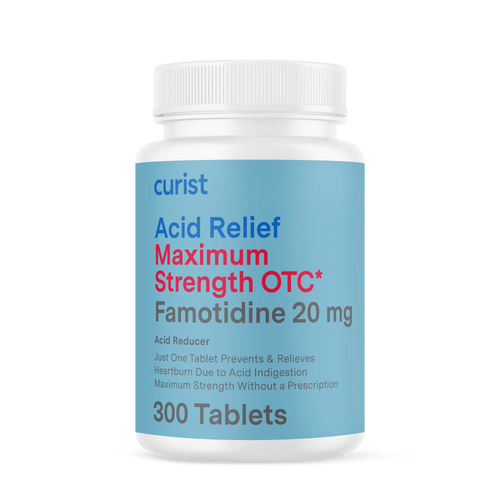By Dr. Faith Goan, PharmD, and Dr. Marc Goldstein, MD, Curist Medical Advisor
Curist delivers over-the-counter medicines to your door at a fraction of the price of traditional brands. We hope everyone stays safe and healthy during this time.
Acid Reflux and Coronavirus: Is Heartburn a Symptom of COVID-19?
Many people are confused with what symptoms are caused by COVID-19. One symptom that is beginning to be questioned more prominently is heartburn. So, what exactly is heartburn? Heartburn is a common problem due to acid reflux. This occurs when content in the stomach finds its way up the esophagus, which causes slight burning in the chest and causing pain. This pain can worsen when lying down.
Is Heartburn a Symptom of Coronavirus (COVID-19)?
The presence of a variety of gastrointestinal problems in COVID-19 infected individuals has been noted in 16 - 50% of infected patients at the time when symptoms are present. The overall mortality in individuals with GI symptoms seems to be similar to overall mortality in COVID-19 infected patients. The good news is heartburn usually is not reported as a symptom in individuals acutely presenting with COVID-19. The Centers for Disease Control and Prevention (CDC), provides a list of symptoms associated with COVID-19 and includes the following:
- Fever or chills
- Cough
- Shortness of breath or difficulty breathing
- Fatigue
- Muscle or body aches
- Headache
- New loss of taste or smell
- Sore throat
- Congestion or runny nose
- Nausea or vomiting
- Diarrhea
The CDC also notes to seek medical attention when you experience:
- Trouble breathing
- Persistent pain or pressure in the chest
- New confusion
- Inability to wake or stay awake
- Bluish lips or face
As you can see, heartburn is not consistent with the findings from the CDC, in meta analysis, or in systematic reviews of the prevalence of gastrointestinal symptoms in patients with diagnosed COVID-19. There was also a study done by the American Gastroenterological Association in July 2020, where they tracked googling search engines and compared them to the time of increase with COVID-19 cases. Most of the searches included: nausea, vomiting, anorexia, diarrhea, and loss of appetite. In the study,there was no search for “heartburn” included.
How to Tell If It’s Heartburn or Chest Pain from Coronavirus (COVID-19)?
Heartburn is nevertheless a very common symptom reported in a substantial portion of the general adult US population. It may be very easy to confuse heartburn with chest pain or pressure in the chest, which COVID-19 patients often experience. So here is a way to differentiate heartburn from chest pressure / pain from other causes:
- Heartburn feels like a burning pain in the chest that usually occurs after eating and may occur at night, the discomfort often worsens when lying down or bending over, and there may be a bitter or acidic taste in your mouth. Taking liquid antacids may quickly relieve this discomfort.
- Chest pain and pressure related to COVID-19 (coronavirus) may feel like it is overall harder to breathe, does not worsen after you eat or while laying down, and does not respond to liquid antacids
Do Acid Reflux & Heartburn Medicines (like Prilosec) Increase My Risk of Getting COVID-19?
There are many heartburn medications available over-the-counter such as: antacids (Tums®), famotidine (Pepcid®), and proton pump inhibitors (omeprazole - available at Curist here, and esomeprazole - available at Curist here). There have been some studies surveying if the use of heartburn medications - specifically proton pump inhibitors (PPIs) - increases your risk of getting COVID-19. One study from The American Journal of Gastroenterology surveyed patients and found that patients using PPIs twice daily had higher odds of testing positive for COVID-19 compared to those using PPIs once daily. Although this showed some data, we can’t assume that PPIs automatically cause COVID-19. There must be more clinical trials done to further prove that heartburn medications increase your chances of getting COVID-19. For now, the recommended dosing for PPIs is once daily, unless recommended otherwise by your healthcare provider.
Do Heartburn, Acid Reflux Medications Help Treat COVID-19?
Although some studies show that heartburn medications, such as proton pump inhibitors (PPIs), may increase your chances of getting COVID-19, other studies have found that taking some heartburn medications may actually have benefits when treating coronavirus (COVID-19). Such heartburn medications include histamine-2 receptor antagonists such as famotidine (Pepcid®).
A retrospective study done from The Gastroenterology Journal found that the use of famotidine was correlated with a reduced risk of patients being intubated or dying from COVID-19 compared to those who did not receive famotidine. Although this study showed some promising data, only randomized clinical trials can determine if famotidine is fully effective against COVID-19. Therefore, it is not recommended to take famotidine (Pepcid®) for prevention of COVID-19.
For more information about coronavirus, please visit the CDC website. As always, if you are not feeling well, please reach out to your medical provider or call 911 in an emergency.
To learn more about tips for treating heartburn, checkout Curist's other heartburn articles:
